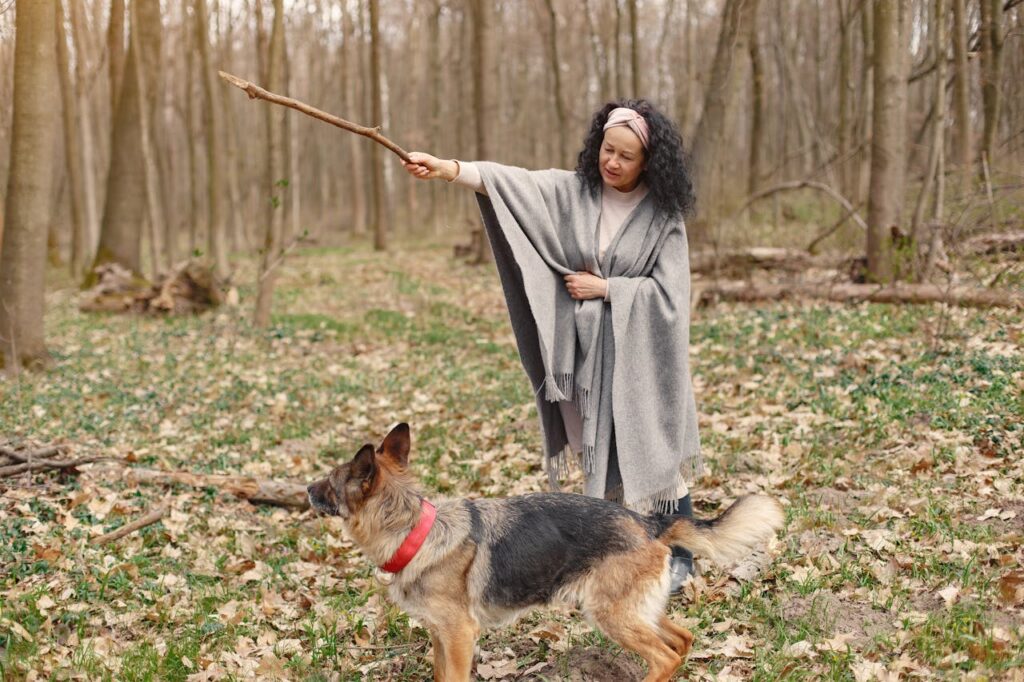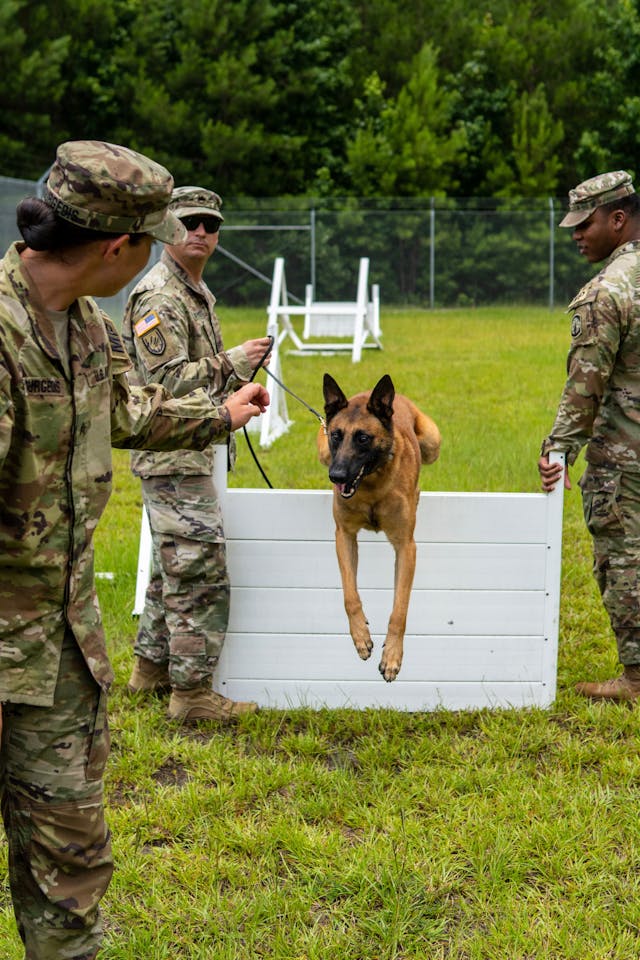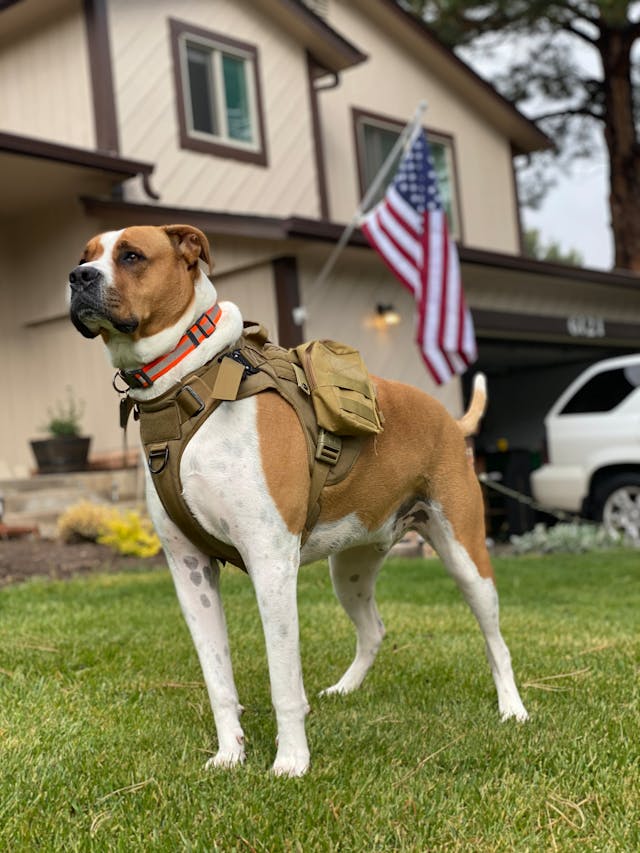This article discusses service dogs for veterans. Service dogs help people who are hurt or have problems after war. These dogs give support and friendship to veterans. We will look at how dogs help veterans feel better.
Table of Contents
Why Veterans Need Help

When veterans come back from war, they may have injuries or mental health issues like PTSD. They need help dealing with these problems.
Why Friendship Helps:
Having a good friend can make you feel better. For veterans, a service dog is a loyal friend who helps them.
How Service Dogs Bond with Veterans
Service dogs are very loyal. They always stay by their veteran’s side. This makes veterans feel safe and comforted. Service dogs can sense when their veteran needs help. If the veteran is anxious or needs physical aid, the dog knows. Their bond helps the dog understand the veteran’s needs.
Service Dogs: A Lifeline for Veterans
Physical Assistance:
Service dogs are specially trained to help veterans with physical tasks. They can fetch items, open doors, and provide stability when walking. For veterans with disabilities, these dogs offer a sense of independence and freedom of movement.
Emotional Support:
The emotional support from service dogs is priceless. For veterans with PTSD or mental health issues, having a loyal companion who can sense distress and provide comfort is a lifeline. These dogs offer solace in difficult moments.
Creating a Routine:
Veterans often struggle with adjusting to civilian life. Service dogs help create a routine and structure, giving veterans confidence and stability in daily activities.
Training Service Dogs for Veterans
Specialized Programs:
Service dogs for veterans undergo specialized training programs. These programs teach skills to assist veterans based on their needs. The dogs learn practical ways to provide help and support.
Customized Training:
The training is customized to each veteran’s individual needs. For visually impaired veterans, dogs learn to guide them. For those with mobility issues, dogs learn to provide stability. For PTSD, dogs learn to avoid panic attacks. The training enhances the veteran’s quality of life.
How Service Dogs Impact Veterans’ Well-Being
Reducing PTSD’s Effects:
Service dogs offer a special type of aid for veterans with PTSD. Having a trained animal nearby can lessen symptoms, reduce anxiety, and give a sense of safety. This allows veterans to navigate daily life more comfortably.
Improving Social Connections:
Service dogs help veterans connect with others. People often interact positively when they see a dog. This reduces feelings of isolation. Veterans feel more confident engaging with their communities.
Matching Veterans with Ideal Service Dogs
Evaluating Each Veteran’s Needs:
Careful assessments match veterans with suitable service dogs. Factors like the veteran’s lifestyle, specific needs, and the dog’s temperament ensure a good partnership.
Bonding Through Training:
Once matched, veterans train alongside their service dogs. This strengthens their bond. Veterans learn to direct and care for their canine companions.
Legal Rights and Recognition for Service Dogs
Laws Protecting Service Dogs:
Understanding legal protections is important for service dogs and handlers. The Americans with Disabilities Act (ADA) allows service dogs access to public spaces. It requires accommodations in various settings.
Recognitions and Awards:
Service dogs for veterans have done amazing work. They are recognized through many awards. Celebrating their achievements shows the good outcomes they bring to veterans’ lives.
Nurturing the Bond Beyond Service

Retirement and Ongoing Care:
As service dogs get older or retire, taking care of them is important. Many organizations help retired service dogs. They make sure the dogs live happy lives as they get older.
Transitioning to Pet Companionship:
When a service dog’s duties change, some veterans make them pets. This starts a new chapter in their relationship. They continue to love and share experiences together.
The Future of Service Dogs for Veterans
Expanding Access to Service Dogs:
People are working to make service dogs more available for veterans. They want more awareness about the benefits. They also want funding for training programs and organizations working together.
Innovation in Training Techniques:
Research and new training methods improve service dogs’ abilities. Using new technologies and better training methods helps service dog programs get better.
Sharing Personal Stories of Transformation
Veterans Share their Experiences:
When veterans talk about how their service dogs have changed their lives, we get a real sense of their impact. These personal stories highlight the resilience, courage, and positive effects service dogs have on veterans.
Spreading Awareness in Communities:
Organizations share stories of transformation through community events and campaigns. By reaching out to local areas, they help people understand the vital role service dogs play in supporting veterans.
Recognizing Service Dogs’ Diverse Roles
More Than Physical Assistance:
Service dogs provide not only provide physical help but also emotional support. Recognizing their varied roles shows how much they impact veterans’ lives, helping with visible and invisible challenges.
Therapy and Comfort:
Service dogs often serve as therapists and sources of comfort. Just having them around can be calming. Their ability to sense and respond to emotional changes helps promote overall well-being.
Service Dogs Educate
School Programs Raise Awareness:
Bringing service dogs into schools teaches students about their important role. School programs raise awareness of how these fantastic animals uniquely assist their owners and why supporting veterans matters.
Dogs Helping Students in Schools:
Service dogs can do more than educate. They also help students feel better in many ways. These dogs can join counseling sessions and reading programs. They can make stressful places feel calm.
Sharing Training Ideas Worldwide
Global Partnership for Better Training:
Organizations worldwide can learn from each other about the best ways to train service dogs. Sharing what they know and how they train can lead to more effective programs globally, helping veterans everywhere.
Supporting Service Dog Rights Worldwide:
Advocating for service dog rights recognition globally ensures veterans get the same level of support when traveling or living abroad. This helps make service dogs a normal part of life for people who need them.
Regular Teaching and Skill Building

Constant Education for Service Pups:
Keeping up with training for service pups is crucial. Routine practice sessions, experiencing fresh places, and updating abilities guarantee service pups stay ready to aid vets in different scenarios.
Advanced Instruction for Particular Tasks:
Some vets might require service pups with particular talents, like health alerts or mobility help. Offering advanced training programs tailored to these needs boosts the capability of service pups to satisfy diverse requirements of their vet handlers.
Service Pup Support Enhancements
Research into Canine Therapy:
Ongoing canine therapy studies explore novel approaches to back vets. From innovative therapeutic interventions to incorporating service pups into mental health treatment regimens, these advancements contribute to evolving service pup support landscapes.
Technology Integration for Enhanced Aid:
Blending technology into service pup assistance is an ongoing exploration sector. Wearable gadgets, intelligent collars, and other tech innovations could enhance communication and coordination between vets and service pups, offering even more tailored aid.
A Shared Journey Bringing Hope and Healing

As we wrap up exploring service pups supporting vets, let’s celebrate the profound impact of these remarkable companions. The journey of vets and service pups exemplifies shared resilience, unwavering loyalty, and transformative power of unconditional affection.





